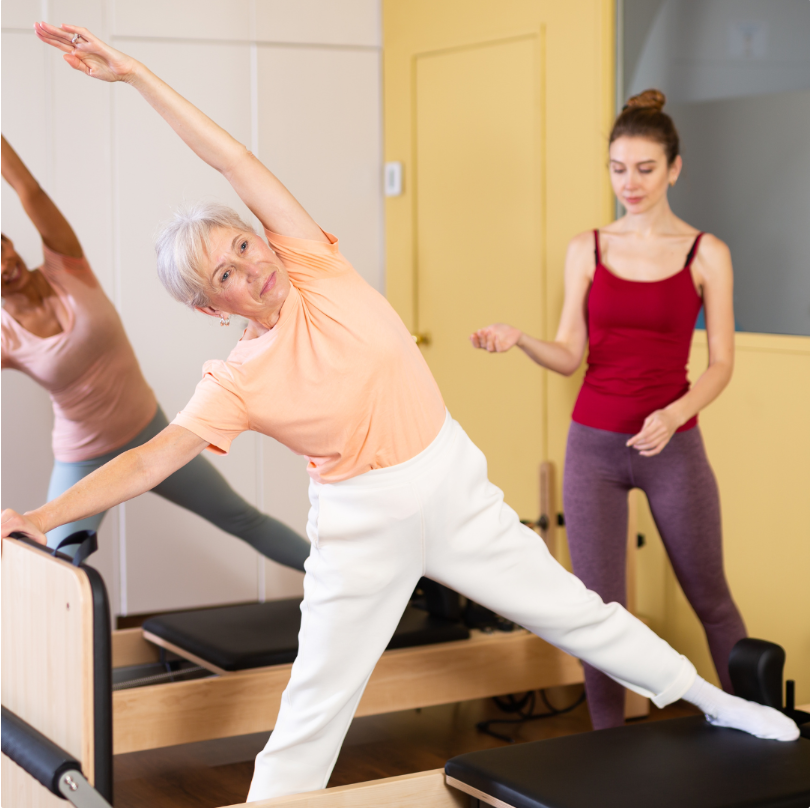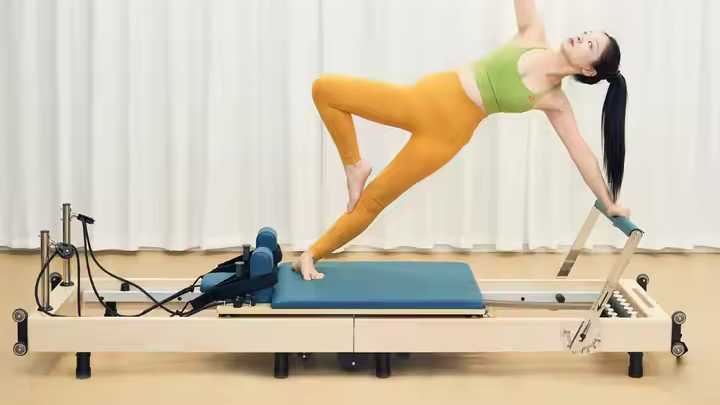Your body changes with age—so should your workout. That’s why more and more women are turning to Pilates for women as a safe, effective way to stay strong, flexible, and balanced.
Whether you're in your 20s or 60s, Pilates is good for women of all ages. It’s low-impact, builds core strength, improves posture, and supports overall well-being. In this article, we’ll explore the top benefits of Pilates and why it could be the perfect fit for your fitness journey.
Suitable for women of all ages
In your teens and 20s, Pilates helps build a solid foundation. It improves posture during growth spurts, enhances body awareness, and can complement athletic training.
It also fosters a positive relationship with your body through mindful movement, which is crucial for mental and emotional development.
Teens and Women in Their 20s
During your teens and 20s, Pilates helps you build a strong physical foundation that supports healthy growth and development. It improves your posture during rapid growth spurts, sharpens your body awareness, and complements other athletic pursuits like running, dance, or team sports. Practicing Pilates now fosters a positive connection with your body, which is crucial for your mental and emotional well-being as you navigate these formative years.

Women in Their 30s to 50s
If you’re balancing a busy career, family responsibilities, and hormonal changes, Pilates can be your reliable tool for stress management and maintaining functional strength. You’ll develop lean muscle tone without bulk, improve your joint stability, and enhance your overall stamina—all while reducing your risk of injury. Pilates works with your body’s natural rhythms, helping you maintain strength and vitality without overexertion.

Women 60 and Older
As you age, you may face challenges such as reduced mobility, joint discomfort, and balance concerns. Pilates offers a low-impact, customizable workout designed to meet your unique needs. It strengthens muscles critical for balance and fall prevention, eases chronic pain from conditions like arthritis or osteoporosis, and helps maintain your independence. With consistent Pilates practice, you can preserve your mobility, coordination, and quality of life well into your later years.

The Unique Benefits of Pilates for Women
Core Strength and Stability
One of the biggest benefits of Pilates for women is its focus on core strength. Your core includes your abdominal muscles, lower back, hips, and pelvic floor—all essential for posture, balance, and everyday movement. For women, a strong core is especially important during pregnancy, postpartum recovery, and menopause.
Through slow, controlled movements, Pilates engages your deep stabilizing muscles, helping you improve balance, avoid injuries, and move more confidently in daily life.
Flexibility and Mobility
Unlike high-impact workouts that stress your joints, Pilates gently increases flexibility and range of motion through stretching and dynamic movement. This makes it an ideal choice for women of all ages, especially if you struggle with stiffness, old injuries, or limited mobility.
Improved flexibility means less physical discomfort and better performance in other activities—whether it's yoga, walking, or running.

Posture and Back Health
If you sit at a desk for long hours or deal with lower back pain, you’re not alone. Poor posture is a growing issue among women and tends to worsen with age.
Pilates strengthens your postural muscles, especially around the spine and shoulders. It helps you maintain better alignment, ease back pain, and even feel more confident with a lifted, upright stance.
Pelvic Floor and Women’s Health
Your pelvic floor muscles support vital organs like your bladder and uterus. Weakness in this area can lead to incontinence, pelvic discomfort, or postpartum complications.
Many Pilates exercises specifically target the pelvic floor, helping you build strength and control. This is especially beneficial during pregnancy, post-birth recovery, and after menopause, when hormonal changes can affect pelvic health. With regular practice, you’ll gain both muscle support and body awareness.

Getting Started: How Women Can Safely Begin Pilates
Choosing Between Mat and Reformer
Mat Pilates is accessible and affordable—all you need is a yoga mat. It focuses on bodyweight movements, making it ideal for beginners.
Reformer Pilates uses a machine with springs and pulleys for added resistance. It offers deeper muscle engagement and more variety but may require supervision or studio access.
Choose what suits your lifestyle and fitness goals. Both methods are effective.

What to Expect in Your First Class
Your first Pilates class will focus on breathing, alignment, and controlled movement. Expect slow, intentional exercises that activate your core and stabilize your spine.
Don’t worry about keeping up—instructors offer modifications for all levels.
Tips for Sticking With It
Start slow: 1–2 sessions per week is enough to build consistency.
Track your progress: Notice how your posture, strength, or stress levels improve.
Find community: Join a class or online group to stay motivated.
Set realistic goals: Focus on how you feel, not just how you look.
Conclusion
No matter your age or fitness level, Pilates meets you where you are—helping you build strength, improve posture, and move with confidence.
If you have any questions or need help choosing the right gear, feel free to contact us via WhatsApp +86-13775339109 or WeChat 13775339100 anytime. We're here to support your Pilates journey.

Talk To Our Experts
Connect with an NQ expert to discuss your product needs
and get started on your project.
FAQs About Pilates for Women
Is Pilates only for women?
No.While many Pilates workouts are widely practiced by women, they are equally beneficial for men. The focus on flexibility, core strength, and low-impact movement makes home Pilates workouts particularly appealing to women.
What are the main benefits of Reformer Pilates?
Pilates reformer benefits It aids injury recover, improves balance and boosts body awareness. Most folks say it clears their mind and gives them energy.
Can beginners do Reformer Pilates?
Yes, this is beginner-friendly reformer pilates. Experienced teachers take you through the fundamentals and tailor routines to your fitness, so it’s safe for beginners.
Is Reformer Pilates good for people with joint pain?
The machine cradles your body, assisting and reducing stress on sensitive areas while you build strength and flexibility.
How often should I do Reformer Pilates for results?
You want to be performing Reformer Pilates about two or three times a week to see results. Consistency is crucial to enhancing your strength, posture and flexibility.
What should I wear to my first Reformer Pilates class?
Wear nice, tight workout clothes that make it easy to move. Don’t wear baggy clothing, it can get caught in the machine! Non-slip socks are always recommended.
Is Reformer Pilates better than Mat Pilates?
The reformer pilates expands on these benefits by providing adjustable resistance and supporting a greater variety of exercises. It can actually be way better for strength and rehab. Both enhance core stability and flexibility.
Post time: Aug-13-2025
